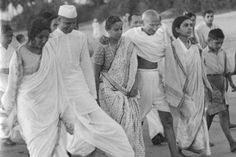Title: Mahatma Gandhi: The Father of India's Freedom
Once upon a time, in the quiet town of Porbandar, located on the western coast of India, a child was born. Little did anyone know that this child, named Mohandas Karamchand Gandhi, would go on to become one of the most revered figures in the history of India and the world.
Mahatma Gandhi, as he is fondly remembered, was born on October 2, 1869. His early life was simple and unremarkable, much like that of any other child in his hometown. However, his journey took a significant turn when he moved to England to study law. It was there that he encountered the ideas of civil rights, freedom, and justice that would shape his destiny.
Returning to India, Gandhi faced the harsh realities of British colonial rule. The injustice and discrimination faced by his fellow countrymen weighed heavily on his heart. In 1915, he returned to India and became a prominent leader in the struggle for India's independence from British rule.
Gandhi's methods of protest were unique and nonviolent, earning him the title "Mahatma," which means "great soul." He believed in the power of truth and nonviolence as a means to achieve change. His famous Salt March in 1930, where he and his followers walked 240 miles to the Arabian Sea to protest the British monopoly on salt production, became a symbol of India's fight for freedom.
Gandhi's philosophy of nonviolence inspired millions across the nation. He led mass movements, boycotts, and protests, all of which aimed at dismantling the oppressive British rule. His principles were not only about political freedom but also about social justice and unity among the diverse people of India.
Find the Books on Mahatma Gandhi here>>
One of Gandhi's most powerful tools was civil disobedience. He encouraged Indians to peacefully defy unjust laws and unfair policies. His unwavering commitment to nonviolence and civil disobedience made him a beacon of hope for oppressed people around the world.
Despite facing numerous imprisonments and personal hardships, Gandhi never wavered in his commitment to justice and freedom. He lived a simple life, dressed in a loincloth and shawl, and promoted self-sufficiency and the spinning of one's own cloth (khadi) as a means of economic independence.
Finally, after years of struggle and sacrifice, India gained its independence on August 15, 1947. Mahatma Gandhi's dream had come true, but he did not revel in personal glory. Instead, he continued his mission to unite Hindus and Muslims and promote peace and harmony among all communities.
Sadly, on January 30, 1948, while at a prayer meeting in New Delhi, Mahatma Gandhi was assassinated by a fanatic who disagreed with his views. The world mourned the loss of a great leader, but his legacy lived on.
Mahatma Gandhi's life and teachings continue to inspire people worldwide. His principles of nonviolence, truth, and social justice remain relevant, serving as a guiding light for those striving for a more just and peaceful world.
Find the Books on Mahatma Gandhi here>>
In the hearts of millions, Mahatma Gandhi is not just a historical figure but a symbol of hope, courage, and the unwavering belief in the power of humanity to bring about positive change. His life story teaches us that even one person, armed with the right values and determination, can change the course of history and inspire generations to come.
Find the Books on Mahatma Gandhi here>>




























0 Comments